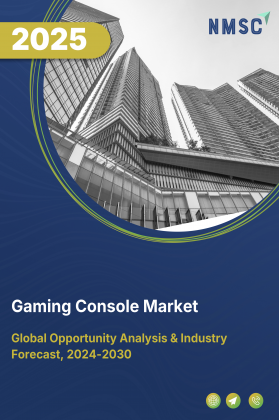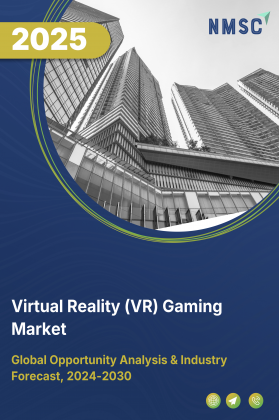
Gaming Console Market by Component (Console Unit, Controller, Game Media and Others), by Console Type (Home Consoles, Handheld Consoles, Hybrid Consoles, Cloud Gaming Devices, Retro Consoles, and Others), by Distribution Channel (Online Retailers, Physical Retail Stores, Direct from Manufacturers, and Others), and by End Users (Residential and Commercial) – Global Opportunity Analysis and Industry Forecast, 2025–2030
Gaming Console Industry Outlook
The global Gaming Console Market size was valued at USD 35.44 billion in 2024, with an estimation of USD 38.70 billion in 2025 and is predicted to reach USD 60.10 billion by 2030 with a CAGR of 9.2% from 2025-2030.
The market is evolving rapidly as consoles transform into connected entertainment platforms that combine immersive gameplay, online interactivity, and advanced hardware. Rising demand for multiplayer and community-driven experiences, supported by features such as cloud saves, downloadable content, and subscription-based game libraries, has strengthened their appeal.
At the same time, technological improvements in processors, graphics, and storage are delivering lifelike visuals, smoother performance, and faster load times, attracting both casual and dedicated gamers. The growing availability of affordable high-speed internet further enhances access to digital content, streaming, and online services, reinforcing consoles as an essential part of the modern gaming ecosystem.
Growth of Online and Multiplayer Games Drives the Market Growth
The rapid growth of online and multiplayer games has become a key driver for video game consoles adoption. Modern gamers seek interactive experiences where they play with friends, join global communities, and participate in competitive tournaments.
Gaming consoles with strong online connectivity provide seamless access to multiplayer modes, cloud saves, downloadable content, and regular updates, which keep players engaged for longer. In addition, subscription-based services offering vast online game libraries further increase the appeal of consoles, making them an essential choice for today’s connected gaming culture.
Introduction of Next-Gen Graphics and Technology Fuel Market Demand
The gaming console market demand is experiencing a significant surge, driven by next-generation graphics and cutting-edge technology. Modern consoles are equipped with high-performance processors, advanced GPUs, and ultra-fast storage systems, enabling features like 4K and 8K resolutions, ray tracing, high frame rates, and near-instant loading times.
These innovations deliver smoother gameplay, lifelike visuals, and immersive audio experiences, appealing to both casual and hardcore gamers. As players increasingly seek realism and engagement, the adoption of next-gen technology continues to be a key factor fueling the growth of the industry.
Affordable Internet & Subscriptions Fuels the Market Expansion
The wider availability of affordable high-speed internet has made it easier for gamers to access and enjoy online features on consoles. With reliable connectivity, players seamlessly download digital games, stream gameplay, and engage in online multiplayer matches.
At the same time, subscription services such as Xbox Game Pass, PlayStation Plus, and Nintendo Switch Online provide access to vast game libraries at low monthly costs, reducing the need for frequent individual purchases. This combination of affordable internet and cost-effective subscription models enhances the overall value of consoles, encouraging more households to adopt them and driving a steady gaming console market growth.
High Cost of Gaming Consoles Limits the Market Growth
The premium pricing of modern gaming consoles limits their accessibility, especially in developing regions where disposable income is lower. In addition to the console’s upfront cost, consumers face extra expenses for accessories, subscription services, and high-priced new game releases. This makes consoles less affordable for a large section of potential buyers, slowing down adoption and acting as a significant restraint on gaming console market expansion.
Cloud Gaming Integration Unlocks New Growth Opportunities for the Market
The rise of cloud gaming presents a major opportunity for console makers to expand their reach. By integrating cloud-based platforms, consoles offer gamers instant access to large libraries without the need for physical discs or massive local storage. This allows players to enjoy high-quality games on-demand, with reduced hardware limitations. As internet speeds improve globally, cloud gaming help console manufacturers tap into new markets, attract casual players, and create additional revenue through subscription-based services.
Market Segmentations and Scope of the Study
The gaming console market report is segmented on the basis of component, console type, distribution channel, and end-users. On the basis of component, the market is divided into console unit, controller, game media, and others. On the basis of console type, the market is classified into home consoles, handheld consoles, hybrid consoles, cloud gaming devices, retro consoles, and others. The handheld consoles segment is further divided into portable and non-portable devices. Based on distribution channel, the market covers online retailers, physical retail stores, direct from manufacturers, and others. Finally, on the basis of end-users, the market is segmented into residential and commercial users. The regional breakdown includes regions such as North America, Europe, Asia-Pacific, and the Rest of the World (RoW).
Geographical Analysis
In North America, the rapid rise of online gaming and competitive esports has become a central factor fuelling the demand for gaming consoles. A large and diverse community of gamers actively participates in multiplayer platforms, competitive matches, and interactive online communities, which drives continuous interest in high-performance consoles.
The region also benefits from advanced digital infrastructure and widespread access to reliable internet, enabling smooth online gameplay and digital content delivery. This strong culture of connected gaming not only sustains existing demand but also attracts new players, making North America one of the most dynamic markets for gaming hardware sales.
In Europe, the growing preference for advanced gaming experiences is a key factor driving the gaming console market share. Consumers are increasingly seeking high-quality graphics, faster performance, and immersive features such as realistic visuals and enhanced sound systems.
The region also has a strong base of tech-savvy players who actively adopt the latest gaming innovations, creating consistent demand for upgraded consoles. Along with this, the rise of digital distribution and subscription-based gaming in Europe supports greater accessibility, encouraging more households to invest in consoles. Together, these factors make technological advancements a strong driver of industry growth in the region.
In Asia Pacific, the rapid growth of the gaming population is a major driver for the market. A large share of the young population actively engages in digital entertainment, and many are transitioning from mobile and PC gaming to more immersive console-based experiences. According to the India Brand Equity Foundation (IBEF) in 2025, with over 65% of its population under 35, India has a large youthful workforce, reflecting the wider regional trend of a digitally active and entertainment-driven demographic.
Rising disposable incomes and expanding urban lifestyles are further boosting demand for premium gaming experiences. This combination of a growing player base, youthful consumers, and higher spending power positions Asia Pacific as one of the fastest-growing markets for next-gen consoles.
In the Rest of the World, which includes Latin America, the Middle East, and Africa, increasing interest in digital entertainment is contributing to the rising demand for gaming consoles. A younger demographic is showing strong interest in interactive and community-based gaming, creating opportunities for console adoption.
As disposable incomes gradually rise and internet access expands, more households in these regions are investing in PlayStation market trends. This combination of youthful consumers, improving connectivity, and growing spending power positions the Rest of the World (RoW) as an important emerging market segment for gaming consoles.
Strategic Innovations Adopted by Key Players
Key players in the gaming console industry are accelerating global expansion through upscale brand launches, service diversification, and strategic partnerships.
-
In January 2025, Nintendo has announced the release of the Nintendo Switch 2, the successor to the original Switch system. The console is set to launch in 2025, with a first-look trailer and details available on Nintendo's official website.
-
In August 2025, ASUS, in collaboration with Microsoft, is set to release the ROG Xbox Ally X on October 16, 2025. This handheld gaming device boasts a 120Hz display and is powered by AMD Ryzen AI Z2 Extreme processors, offering a portable AAA gaming experience.
-
In August 2025, Lenovo launched its Legion Go 2 gaming handheld at IFA 2025, with a press event scheduled for September. The device is expected to offer next-gen gaming performance and features, expanding Lenovo's gaming ecosystem.
Key Benefits
-
The report provides quantitative analysis and estimations of the industry from 2025 to 2030, which assists in identifying the prevailing market opportunities.
-
The study comprises a deep-dive analysis of the current and future gaming console market trends to depict prevalent investment pockets in the market.
-
Information related to key drivers, restraints, and opportunities and their impact on the market is provided in the report.
-
Competitive analysis of the players, along with their market share is provided in the report.
-
SWOT analysis and Porters Five Forces model is elaborated in the study.
-
Value chain analysis in the market study provides a clear picture of roles of stakeholders
Gaming Console Market Key Segments
By Component
-
Console Unit
-
Controller
-
Paddle
-
Joystick
-
Gamepad
-
-
Game Media
-
Game Cartridge
-
Optical Media
-
Digital Distribution
-
Cloud Gaming
-
-
Others
By Console Type
-
Home Consoles
-
Handheld Consoles
-
Portable
-
Non-Portable
-
-
Hybrid Consoles
-
Cloud Gaming Devices
-
Retro Console
-
Others
By Distribution Channel
-
Online Retailers
-
Physical Retail Stores
-
Direct from Manufacturers
-
Others
By End User
-
Residential
-
Commercial
By Region
-
North America
-
The U.S.
-
Canada
-
Mexico
-
-
Europe
-
The UK
-
Germany
-
France
-
Italy
-
Spain
-
Denmark
-
Netherlands
-
Finland
-
Sweden
-
Norway
-
Russia
-
Rest of Europe
-
-
Asia-Pacific
-
China
-
Japan
-
India
-
South Korea
-
Australia
-
Indonesia
-
Singapore
-
Taiwan
-
Thailand
-
Rest of Asia-Pacific
-
-
RoW
-
Latin America
-
Middle East
-
Africa
-
Key Players
-
Sony Group Corporation
-
Microsoft Corporation
-
ASUSTeK Computer Inc.
-
Lenovo Group Limited
-
MSI
-
Analogue, Inc.
-
Valve Corporation
-
Logitech
-
Mad catz global limited
-
Razer Inc.
-
AYANEO
-
GPD
-
Anbernic
Report Scope and Segmentation
|
Parameters |
Details |
|
Market Size in 2025 |
USD 38.70 Billion |
|
Revenue Forecast in 2030 |
USD 60.10 Billion |
|
Growth Rate |
CAGR of 9.2%from 2025 to 2030 |
|
Analysis Period |
2024–2030 |
|
Base Year Considered |
2024 |
|
Forecast Period |
2025–2030 |
|
Market Size Estimation |
Million (USD) |
|
Growth Factors |
|
|
Countries Covered |
28 |
|
Companies Profiled |
15 |
|
Market Share |
Available for 10 companies |
|
Customization Scope |
Free customization (equivalent up to 80 working hours of analysts) after purchase. Addition or alteration to country, regional, and segment scope. |
|
Pricing and Purchase Options |
Avail customized purchase options to meet your exact research needs. |
















 Speak to Our Analyst
Speak to Our Analyst
























